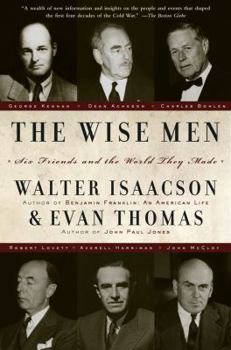The Wise Men: Six Friends and the World They Made
Select Format
Select Condition 
Book Overview
A captivating blend of personal biography and public drama, The Wise Men introduces the original best and brightest: Averell Harriman, Secretary of State Dean Acheson, George Kenan, Secretary of Defense Robert Lovett, John McCloy, and Ambassador to the Soviet Union Charles Bohlen.
Format:Paperback
Language:English
ISBN:0684837714
ISBN13:9780684837710
Release Date:June 1997
Publisher:Simon & Schuster
Length:864 Pages
Weight:2.41 lbs.
Dimensions:1.5" x 6.2" x 9.3"
Customer Reviews
4 ratings
A Reminder...
Published by Thriftbooks.com User , 16 years ago
... of a ten-year-old book that shouldn't be forgotten, the "biography" of American foreign policy from the Truman years to the apotheosis of Reagan. Like most biographies, this one concentrates on the childhood of the Cold War containment/exhaustion strategy, the DNA so to speak of neo-conservatism, born of a Democratic mother and a Republican father. Any reader of my other reviews, who doubts my assertion that Ronald Reagan and George Herbert Bush were mere inheritors of a foreign policy as rigidly sustained as if by primogeniture, should take on this book as ferociously as you dare. The six Wise Men -- McCloy, Bohlen, Acheson, Lovett, Harriman, and Kennan -- would be the last to blush at being identified as "The Greatest Generation" or "The Best and the Brightest." Their egos and their sense of elite entitlement to lead are central to their story. This is a deeper portrait of their intellectual mode than either of those two just-mentioned best-sellers. Authors Isaacson and Thomas are clearly of the same "old school" as their subjects. Their admiration is in a sense self-adulation; even when the Wise Men acknowledged errors, the very nature of their errors turned out to reflect wisdom. My own admiration for the six is considerably more limited, but it's hard to deny the authors' thesis that these Yale and Harvard whiz-kids and their colleagues were the movers-and-shakers of administration after administration. Even as some of them lost a portion of their self-assurance in light of the massive failure in Vietnam, they continued to limn the hegemonist, exceptionalist conception of America which has continued to fail up to the current massive failure in Iraq. Given that all six were perceived as "liberals" aligned with Democratic administrations, some partisans of the other party may come to this book with an established antipathy toward its subjects. All I can say to that is "read it and learn!"
Essential for understanding WWII to Vietnam
Published by Thriftbooks.com User , 17 years ago
All sorts of things no one knows about how decisions were made after WWII that have affected all of us ever since. Well written too.
Wisdom Then
Published by Thriftbooks.com User , 18 years ago
In a 1996 interview with David Gergen on NPR, one of this book's central characters makes a case for, what I will hazard to suggest, is one of the authors' central views; DAVID GERGEN: Let me ask you this in terms of thinking back over then of that period of American foreign policy in the last forty or fifty years, one of the ironies here is that in an age of information you suggest we have too little wisdom. GEORGE KENNAN: Yes, I do, and one of the things that bothers me about the computer culture of the present age is that one of the things of which it seems to me we have the least need is further information. What we really need is intelligent guidance in what to do with the information we've got. Thus The Wise Men becomes a paean to, as the authors' admit at the outset, "the twentieth-century tradition of an informal brain trust of internationalists who first served Woodrow Wilson at Versailles and returned home to found the Council on Foreign Relations, " establishing along the way, "a distinguished network connecting Wall Street, Washington, worthy foundations, and proper clubs." The polemics about where one finds wisdom aside, The Wise Men provides a fascinating and uncompromising study of the evolution of U.S. foreign policy vis-à-vis the Soviet Union from the establishment of formal relations during the Roosevelt administration to Vietnam from the perspective of six of it's most significant players; Dean Acheson, Charles "Chip" Bohlen, Averell Harriman, George Kennan, Robert Lovett and John McCloy with side trips into electoral politics and the Middle East. Although I found the authors' fascination with many of these individuals' membership in Harvard's elite Porcellian and Yale's Skull and Bones clubs a bit off-putting (to say nothing of the not-so-veiled apologia for a certain social elitism . . . call me a populist), it would be difficult to find six more pivotal characters. The arguably lesser stars make significant appearances, most notably the Alsop and Bundy brothers, Clark Clifford, James Forrestal and Paul Nitze. I will even forgive the authors' treatment of one of my heroes', George Kennan's, emotional shortcomings. For those of a certain ideological bent, John Foster Dulles and Dean Rusk are not treated sympathetically. It all rings true notwithstanding and The Wise Men makes an excellent post-war study of U.S. foreign policy particularly as a counterpoint to David Halberstam's "Best and the Brightest" for those too busy or cheap to subscribe to Foreign Affairs.
Exhaustive (exhausting), and fascinating
Published by Thriftbooks.com User , 25 years ago
This book is fantastically interesting. The detail and the descriptions of personalities involved make the subject matter more than palatable, even to the less scholarly among us. The book is, however, very, very long and would have perhaps been better broken up into several volumes. I would characterize it as very well written, exhaustively researched, slightly fawning and uncritical at times, and, in general, well worth lugging around.






